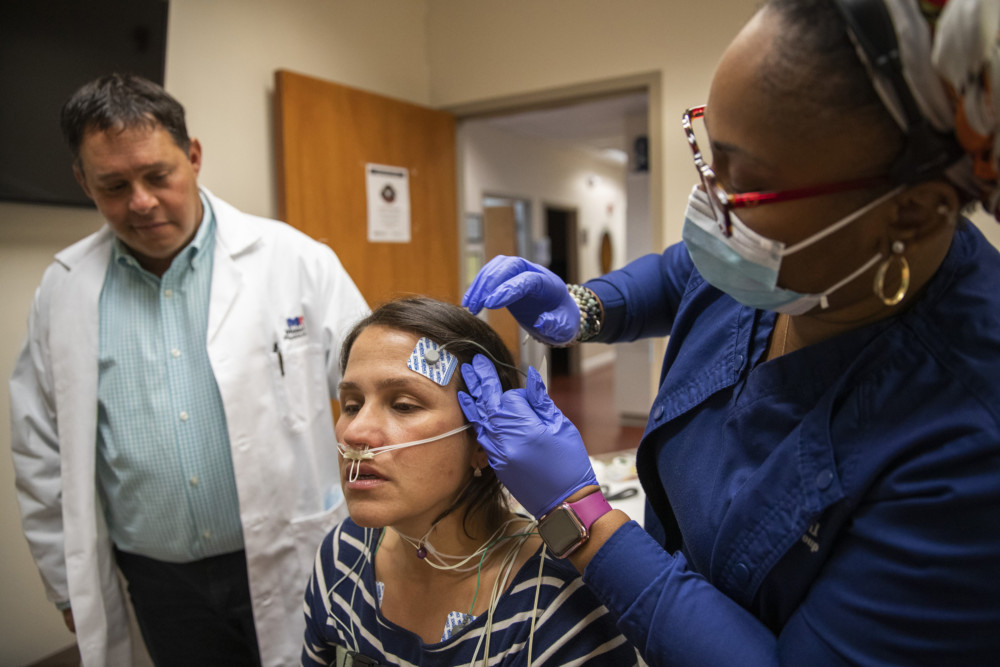Cindy Krischer Goodman
South Florida Sun Sentinel
WWR Article Summary (tl;dr) From medical devices to sleep coaching, intense therapy, acupuncture, and even hypnosis, patients battling sleep disorders DO have options to help battle insomnia.
Ft. Lauderdale
As the country emerges from the pandemic, South Florida doctors say they are flooded with patients who are battling sleep disorders.
Some people can’t get back on a normal sleep schedule after working from home and staying up late. Others gained weight and their airway obstruction worsened. Then, there is a group with anxiety, grief or guilt, suffering what has become known as coronasomnia.
“Insomnia has gotten worse with the epidemic,” said Dr. Samuel Gurevich, pulmonologist and sleep specialist with Cleveland Clinic Florida. “Stress and difficulty sleeping go hand-in-hand.”
In South Florida, the sleep field includes surgeons, pulmonologists, internists and therapists who attack the barrier to a good night’s rest through different approaches. As the pandemic brings more patients in — desperate to shake off fatigue — experts are using new innovations to help them sleep better.
Those innovations range from medical apparatus and implanted devices to sleep coaching, intense therapy, acupuncture and hypnosis.
One thing sleep experts all advocate: Ditch the sleeping pills.
“You will get dependent and end up needing more and more,” Gurevich said. “When you try to come off them, you will be worse off than when you started.”
Doctors say they first look for medical issues, which include sleep apnea, a condition when breathing disrupts sleep. No longer do people need to sleep in labs to know if they have this condition. Most of the time they can do home tests that monitor breathing and other vital signs.
Dr. Brian Gotkin, a pulmonologist and sleep specialist with Memorial Healthcare System, says heart conditions and weight gain brought on by the pandemic have aggravated sleep apnea cases.
“More people were inactive during COVID. They gained weight and it has affected their snoring and sleep-disordered breathing, and now they are more tired during the day and want help,” said Gotkin, who runs Memorial’s sleep lab.
Advances in the CPAP machine used to treat sleep apnea have led to more comfortable breathing masks and smaller travel devices, he said.
One of the newest treatments for obstructive sleep apnea has recently become covered by insurance and Medicare in Florida. It’s an FDA-approved device that gets implanted in the body and controlled by the patient using a small, handheld remote turned on before bedtime.
Sleep surgeons throughout South Florida have begun to offer this treatment.
Charles Zeller, an otolaryngologist with the Broward Health Physician Group, said he already has done three implants this year. He also has partnered with doctors from Pulmonary, Critical Care and Sleep Disorders Institute of South Florida to perform the surgery at Broward Health North and treat patients for follow up in Palm Beach County.
“We are trying to help the huge upsurge of patients from Jupiter down that just can’t find a good treatment solution for their sleep apnea,” Zeller said.
For chronic insomnia, South Florida sleep coaches say they are jammed with patients who need help retraining their body and mind to shut down after multiple stressors caused by the pandemic. Some arrive after primary care doctors refuse to refill their sleeping pill prescriptions, the coaches say.
“With insomnia, there’s an event that sets it off, in this case, the pandemic,” said Elizabeth Bonet, a sleep therapist in Hollywood. “Then you get into a bad habit of poor sleep and then worry about your poor night’s sleep, which makes it worse. I am coaching a lot of people now who have come to realize their problem is fixable.”
Bonet said coaching combined with hypnosis takes about 10 to 12 weeks to resolve sleep issues.
Along with coaching, Dr. Ashwin Mehta, an internist and sleep specialist with Memorial Healthcare System, said he uses acupuncture, nutrition, exercise and mindfulness techniques to target insomnia. More of his patients are healthcare workers who endured the trauma of COVID.
“Insomnia can transition from acute sleep loss to a more chronic pattern,” Mehta said. “We need to break that cycle.”
Mehta said patients need to know coaching and other techniques are not the quick fix provided by medication but have longer-lasting effects.
“It takes time to let go and relax,” he said. “During a pandemic, more people find that’s something they need to make a conscious effort to do.”
____
Distributed by Tribune Content Agency, LLC.














































































































































































































































































































































































